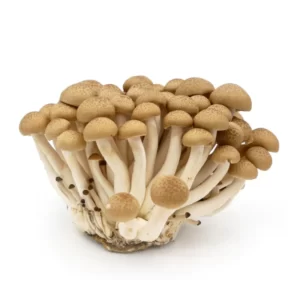The Health Benefits and Culinary Delights of Shimeji Mushrooms
In this article, we delve into the fascinating realm of shimeji mushrooms, their various types, nutritional value, cooking methods, and the incredible flavors they bring to your dishes. Join us on this gastronomic journey as we uncover the wonders of shimeji mushrooms and provide you with everything you need to know.

1. The Origins and Types of Shimeji Mushrooms
Shimeji mushrooms, scientifically known as Hypsizygus tessellatus, belong to the fungi kingdom and have a rich history spanning centuries. Originally cultivated in East Asia, particularly in Japan, China, and Korea, these delicate mushrooms have now gained popularity worldwide due to their unique flavor and texture.
There are several types of shimeji mushrooms, each with distinct characteristics and culinary uses:
- White Shimeji: Also known as beech mushrooms, these small, slender mushrooms feature a creamy white color and a slightly crunchy texture. They possess a delicate nutty flavor, making them a perfect addition to stir-fries, soups, and salads.
- Brown Shimeji: With a darker hue and firmer texture, brown shimeji mushrooms offer a deeper, earthier taste compared to their white counterparts. They are commonly used in Japanese cuisine, especially in hot pots, sukiyaki, and donburi dishes.
- Black Shimeji: Known for their striking appearance, black shimeji mushrooms boast a velvety black cap and slender stems. They have a more robust flavor profile and are often sautéed or stir-fried to enhance their smoky, umami taste. These mushrooms are highly sought after for their visual appeal and versatility in both Asian and Western cuisines.
2. Nutritional Profile of Shimeji Mushrooms
Shimeji mushrooms offer not only an exquisite taste but also an impressive array of nutrients that contribute to a healthy diet. Here is a breakdown of their nutritional profile per 100 grams:
- Calories: Shimeji mushrooms are a low-calorie food, providing only approximately 30 calories per 100 grams. This makes them an excellent choice for those watching their calorie intake.
- Protein: These mushrooms are a source of quality plant-based protein, containing around 3 grams per 100 grams. Incorporating shimeji mushrooms into your meals can be particularly beneficial for individuals following vegetarian or vegan diets.
- Fiber: Shimeji mushrooms are rich in dietary fiber, with approximately 3 grams per 100 grams. Fiber promotes digestive health, aids in weight management, and helps regulate blood sugar levels.
- Vitamins: Shimeji mushrooms are a good source of vitamins such as niacin (vitamin B3), riboflavin (vitamin B2), and pantothenic acid (vitamin B5). These vitamins play vital roles in energy production, cell metabolism, and overall well-being.
- Minerals: Shimeji mushrooms contain essential minerals like potassium, phosphorus, and copper. These minerals are involved in various physiological processes, including bone health, nerve function, and the production of red blood cells.
3. Health Benefits of Shimeji Mushrooms
In addition to their delightful taste and nutritional value, shimeji mushrooms offer a range of health benefits that make them a valuable addition to your diet. Let’s explore some of the potential advantages:
- Immune System Support: Shimeji mushrooms contain beta-glucans, a type of polysaccharide known for their immune-enhancing properties. These compounds stimulate the activity of immune cells, helping to strengthen the body’s natural defense mechanisms and protect against infections.
- Antioxidant Activity: Rich in antioxidants, shimeji mushrooms help combat harmful free radicals in the body. These antioxidants, such as ergothioneine and selenium, play a crucial role in reducing oxidative stress and promoting overall health.
- Anti-Inflammatory Properties: Certain compounds found in shimeji mushrooms, including phenols and flavonoids, exhibit anti-inflammatory effects. Regular consumption of these mushrooms may help reduce inflammation in the body, potentially benefiting individuals with inflammatory conditions like arthritis or asthma.
- Heart Health: Shimeji mushrooms are low in cholesterol and saturated fat, making them a heart-friendly food choice. They also contain compounds that can help lower blood pressure and maintain healthy cholesterol levels, reducing the risk of cardiovascular diseases.
- Weight Management: With their low calorie and high fiber content, shimeji mushrooms can be a valuable asset for individuals aiming to manage or lose weight. The fiber in these mushrooms promotes feelings of fullness, curbing overeating and assisting in weight control.
- Digestive Health: The fiber content in shimeji mushrooms supports a healthy digestive system by promoting regular bowel movements and preventing constipation. Additionally, the prebiotic properties of these mushrooms may contribute to a balanced gut microbiota, which is essential for optimal digestion and overall well-being.
4. Culinary Uses and Cooking Tips
Shimeji mushrooms offer a versatile culinary experience, adding a delightful umami flavor and unique texture to various dishes. Here are some cooking tips and ideas to help you make the most of these mushrooms:
- Stir-fries and Sautes: Sautéing shimeji mushrooms in a hot pan with a drizzle of oil allows their natural flavors to shine. Combine them with other vegetables, such as bell peppers, broccoli, or snap peas, for a delicious and nutritious stir-fry. Add a splash of soy sauce or a sprinkle of sesame oil to enhance the overall taste.
- Soups and Stocks: Shimeji mushrooms make a wonderful addition to soups and stocks, imparting a rich, savory flavor. Whether you’re preparing a classic miso soup, a hearty vegetable broth, or a creamy mushroom soup, adding shimeji mushrooms will elevate the taste and provide a satisfying texture.
- Rice and Noodle Dishes: Incorporate shimeji mushrooms into your favorite rice or noodle recipes for a burst of umami goodness. They pair exceptionally well with Asian-inspired dishes such as fried rice, ramen, or even a flavorful mushroom risotto.
- Hot Pots and Stews: The earthy flavor of shimeji mushrooms makes them an ideal ingredient for hot pots and stews. Whether you’re preparing a traditional Japanese shabu-shabu, a Korean kimchi jjigae, or a hearty vegetable stew, shimeji mushrooms will contribute depth and complexity to the overall taste.
- Grilled or Roasted: For a unique twist, try grilling or roasting shimeji mushrooms. Toss them with olive oil, season with your favorite herbs and spices, and roast them in the oven or grill until tender and slightly caramelized. These roasted mushrooms make a delectable side dish.

5. Where to Find Shimeji Mushrooms
Shimeji mushrooms can be found in various places, depending on your location and accessibility to specialty stores or markets. Here are some common sources where you can find these mushrooms:
- Local Grocery Stores: Many well-stocked grocery stores, particularly those with a diverse selection of fresh produce, often carry shimeji mushrooms. Check the vegetable section or inquire with the store staff to locate them.
- Farmers Markets: Local farmers markets are excellent places to find fresh and locally sourced shimeji mushrooms. These markets typically offer a wide range of seasonal produce, including specialty mushrooms.
- Asian Grocery Stores: Asian grocery stores are often the go-to destination for finding shimeji mushrooms. These stores specialize in Asian ingredients and commonly stock various types of mushrooms, including shimeji.
- Online Retailers: If you have difficulty finding shimeji mushrooms in your local area, you can explore online retailers that specialize in delivering fresh produce. They often provide a wide range of mushrooms, including shimeji, and deliver them straight to your doorstep.
When purchasing shimeji mushrooms, look for ones that are firm and free from any signs of spoilage. The caps should be intact and not overly wrinkled. It’s best to consume them as soon as possible after purchase for optimal flavor and texture.
6. Conclusion
In conclusion, shimeji mushrooms are a culinary delight that not only adds a burst of flavor to your dishes but also provides numerous health benefits. From their origins in East Asia to their different types and versatile cooking methods, these mushrooms offer a wide range of possibilities in the kitchen.
With their low calorie and high nutritional value, shimeji mushrooms are an excellent choice for those seeking a healthy and delicious addition to their meals. Whether you stir-fry them, incorporate them into soups, or use them in rice and noodle dishes, their delicate taste and unique texture are sure to impress.
Remember to explore your local grocery stores, farmers markets, or Asian grocery stores to find fresh shimeji mushrooms. Alternatively, you can opt for online retailers that deliver them to your doorstep.
So why not elevate your culinary experiences and embrace the wonders of shimeji mushrooms? Incorporate them into your favorite recipes, explore new flavors, and enjoy the health benefits that these remarkable fungi have to offer.